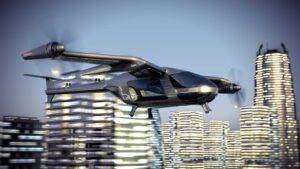Britain Set to Trial ‘Flying Taxis’ by 2026, Potentially Boosting UK Economy by £45bn
The UK is gearing up to trial its first electric flying taxis by 2026, a move that could see these futuristic modes of transport in regular use by the end of the decade, according to government sources. Read more: Britain Set to Trial ‘Flying Taxis’ by 2026, Potentially Boosting UK Economy by £45bn


The UK is gearing up to trial its first electric flying taxis by 2026, a move that could see these futuristic modes of transport in regular use by the end of the decade, according to government sources.
Unveiled on Monday, the Future of Flight initiative sets out a roadmap aimed at bringing technology once relegated to the realms of science fiction into the skies of the UK. After initial trials in 2026, the first piloted flying taxi services are slated to commence regular operations by 2028, with demonstrations of pilot-less variants expected by 2030.
To accommodate this innovative mode of transportation, the government plans to construct ‘vertiports’ across the UK. These vertiports, akin to mini airports designed for drones and electric aircraft capable of vertical take-offs, will serve as pivotal hubs for this groundbreaking technology.
In addition to revolutionising passenger transport, the government is exploring the expanded use of drones for crime prevention and facilitating emergency medical deliveries, with projections suggesting that drone technology could inject a substantial £45bn into the UK economy by 2030.
While trials of flying air taxis have already kicked off in the US, experts within the aviation sector believe that the world stands on the brink of a new revolution. A multitude of startups has emerged globally, with established industry giants like Boeing and Airbus throwing their weight behind various ventures.
The Civil Aviation Authority (CAA) forecasts widespread adoption of flying taxis, with the inaugural commercial flight of an electric vertical take-off and landing (eVTOL) aircraft slated for the Paris Olympics.
Aviation and Technology Minister, Anthony Browne, commented, “Cutting-edge battery technology is poised to revolutionize transportation as we know it. This plan ensures that we have the necessary infrastructure and regulations in place to turn this vision into reality. From flying taxis to emergency service drones, we’re positioning the UK at the forefront of this transformative shift in transportation, thereby enhancing people’s lives and bolstering the economy.”
Browne is scheduled to visit Vertical Aerospace’s Bristol facility today, where the UK-based company is conducting trials of a five-seater air taxi capable of reaching speeds of up to 200mph.
Duncan Walker, Chief Executive of Skyports and Chairman of the Future of Flight Industry Group, remarked, “The UK boasts one of the world’s most significant aerospace industries and is ideally positioned to lead the charge into the next era of aviation. The government and industry share a collective commitment to fostering the development, industrialization, and integration of new aviation technologies. Sustained collaboration will ensure that we capitalize on the substantial domestic and international market opportunities presented by the future of flight.”
Read more:
Britain Set to Trial ‘Flying Taxis’ by 2026, Potentially Boosting UK Economy by £45bn






















